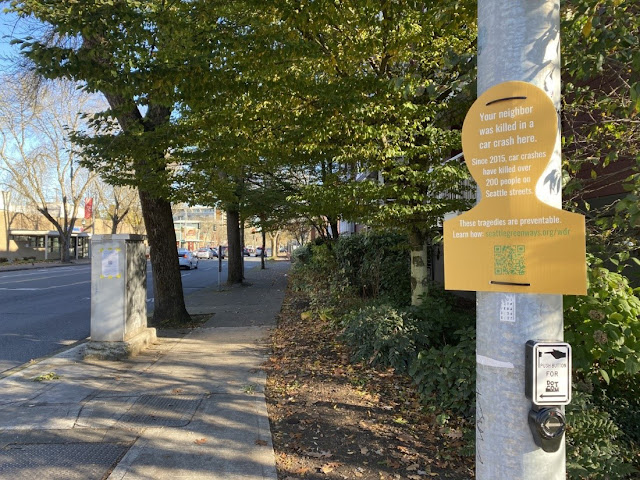By Hannah Weinberger
For some of us, the story belongs to a friend. For others, a family member. Or maybe you're the one who will find this post difficult to read because you've had direct experience of traffic violence. You've experienced the impact as a driver struck you with a vehicle that outmasses you by at least a ton when you were just walking or biking somewhere. Or you were in a vehicle involved in a crash.
You're definitely not alone. Each day, more than 100 people are killed and thousands more injured on U.S. roads while simply going about their lives. These facts often get reduced to dots on a map or a bar chart. But every crash creates deep personal losses and alters lives forever—or ends them.
 |
| A cyclist rides past a roadside memorial for crash victims along Preston-Fall City Road |
In our state alone, traffic violence killed at least 745 people in 2022 – the most people in a single year since 1990 – with particular threat to people walking, biking and rolling. In fact, the number of people who died because they were struck by a driver while walking or rolling has increased 141% since 2012 and reached a 30-year high in 2021. Many people are driving bigger and bigger vehicles, which research shows are more injurious to victims in crashes. Some streets and roads don't yet have places to walk or bike or get to a bus stop, but people nonetheless need to use them.
 |
| Based on data from the Washington State Traffic Safety Commission |
Processing the sheer amount of preventable traffic death we face as a society is more than many people can handle. But for the organizers behind World Day of Remembrance for Road Traffic Victims, it's something we can't allow ourselves to become numb to or accept as the cost of modern living. Not when we could do more.
World Day of Remembrance, held every year on the third Sunday of November for the past three decades, draws attention to the human toll of traffic violence and demands solutions that prevent it. Hundreds of ceremonies, performances and marches simultaneously honor the more than 50 million people killed and more than 100 million injured worldwide since the first person was killed in a car crash in 1869. Participants highlight how much more support victims and their families need as they recover or mourn, and the need for accountability and action to create safer roads and save lives.
Our communities regularly come out for World Day of Remembrance, and there were lots of ways to be part of this year's events. In 2023, at least three communities — Seattle, Bellevue and Tacoma — created opportunities for people to mourn and demand action.
Our state not only rejects traffic violence as an inevitability, but through its Target Zero initiative (being updated now), aims to eliminate traffic deaths by 2030. We were the first state in the nation to set zero as the only acceptable number for traffic deaths and serious injuries.
Our agency is recognized as a national leader in its efforts to create a transportation network that works comfortably for everyone, whether they drive, walk or roll. That expectation became a legal requirement for the agency's projects in 2022 through the legislature's Complete Streets mandate.
We also recently adopted the Safe System Approach, a holistic approach that incorporates safe roads, safe speeds, safe vehicles, safe users, and post-crash care. Changing just one of these isn't enough. Like the "Swiss cheese" model of preventing the spread of disease, we need multiple layers of prevention. Addressing each of these aspects of transportation helps us improve safety for all road users.
What your neighbors did to mark World Day of Remembrance
- Tacoma residents hosted a vigil for victims likeMichael Weilert, a 13-year-old Parkland resident killed while crossing the street at a crosswalk with his bicycle.
- Meanwhile in Seattle, members of Seattle Neighborhood Greenways placed physical reminders of our neighbors taken too soon, leaving orange silhouette cut-outs at locations where drivers killed people in car crashes.
- Bolstered by a new traffic safety action plan, the City of Bellevue recognized WDoR for the first time, including with an official proclamation during a meeting of the City Council.
In these and other places, people are gathering to say together, "Enough! We need action." As the WDoR organizers state on their site, "We do not want more victims to remember, we want to live our lives together."

No comments:
WSDOT comment policy
Post a Comment